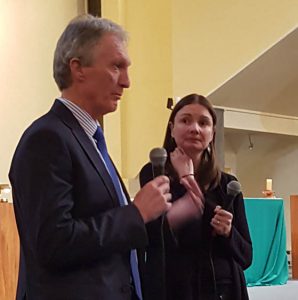WelCom September 2018:
A meeting was held recently at St Peter and Paul’s Church Lower Hutt with information about human trafficking. Br Kevin Dobbin fms reports.
There’s no slavery in New Zealand. Abraham Lincoln and Wilberforce dealt with that issue long ago!

Rebecca Miller and Peter Devoy of Immigration New Zealand are spreading the message on the issue of modern slavery.
Yeah, right! Such a statement of history is the kind trumped up by one who is removed from the reality of struggle against injustice in this 21st century, AND in New Zealand. On Monday 16 July, ANZRATH (Aotearoa New Zealand Religious Against the Trafficking of Humans) organised two excellent speakers for an open evening at Ss Peter and Paul Church, Lower Hutt. Rebecca Miller, Manager for People Smuggling, Human Trafficking & Regional Cooperation, and Peter Devoy, Assistant General Manager, Compliance and Border Operations, both at Immigration New Zealand, spoke on the issue of modern slavery. This umbrella term covers human trafficking – usually of new migrants – and slave-like practices such as servitude, forced labour, forced marriage, the sale and exploitation of children and debt bondage.
Both speakers spoke about the issue from their different perspectives with plenty of time for questions from the audience. Canadian Rebecca spoke of what brought her to New Zealand and the consequent involvement in this issue through the Ministry of Immigration, and Peter from his years as a senior officer in NZ Police. We were made aware of some tragic statistics.
- In 2016 an estimated 40.3 million people were victims of modern slavery.
- Of that number 24.9 were in forced labour – a process of deception to ensure industries such as construction, agriculture, horticulture, viticulture, the services and fishing make huge profits.
- Nearly two thirds of that number were in the Asia-Pacific region.
- Human trafficking and exploitation is the third largest criminal ‘industry’ in the world, earning the exploiters $150 billion annually.
There were only 9000 convictions globally in 2017; it is low risk and high profit crime.
Human trafficking involves:
- 1. The recruitment, transportation, move, transfer or harbouring of persons through
- 2. Deception and/or coercion for the purpose of
- 3. Exploiting or facilitating the exploitation of the person.
It is aided and abetted in this country by people smuggling, that is, the facilitated entry into New Zealand of an unauthorised migrant for financial or other material gain. The exploitation is particularly unjust because such migrants come for a better life, only to be trapped in poverty and debt by recruiters, agents and employers.
New Zealand had its first trafficking conviction in December 2016 where the culprit was sentenced to nine years and six months in jail and ordered to pay over $28,000 reparation to his victims. As someone among the audience mentioned, he would live more comfortably in prison, than the conditions in which he had his victims living. Further investigations are continuing.
Exploitation happens also with New Zealand citizens, as RNZ’s John Campbell’s current research and reports not infrequently reveal. Both the Ministry of Immigration, and that of Business, Innovation and Employment, have websites worth exploring to address these issues. Complaints of such injustice against migrants or citizens can be made to the Labour Inspectorate contact centre (0800 20 90 20) or to Crimestoppers New Zealand (0800 555 111) or you can make contact anonymously at: www.crimestoppers-nz.org/about/contact-us/email-anonymously